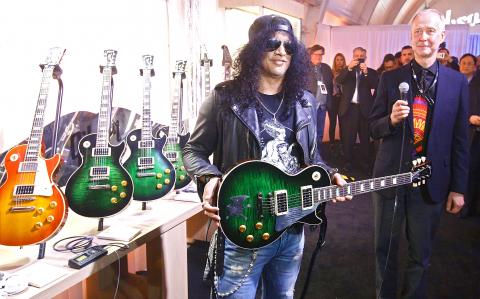The maker of the Gibson guitar, omnipresent for decades on the American music stage, is filing for bankruptcy protection after wrestling for years with debt.
A pre-negotiated reorganization plan filed on Tuesday will allow Gibson Brands Inc to continue operations with US$135 million in financing from lenders.
Gibson guitars have been esteemed by generations of guitar legends. After Chuck Berry died, his beloved cherry-red Gibson guitar was bolted to the inside of his coffin lid. David Bowie favored the 1989 Gibson L4 when he fronted Tin Machine. Slash swears by them.

Photo: EPA
“It is one of the most widely recognized brand names on planet Earth,” said George Gruhn of Gruhn Guitars, a world-famous vintage instrument store.
Founded in 1894 and based in Nashville, Tennessee, Gibson has the top market share in premium electric guitars.
It sells more than 170,000 guitars a year in more than 80 countries, including more than 40 percent of all electric guitars that cost more than US$2,000, according to a bankruptcy filing.
The company has already sold off some noncore brands, acquisitions that contributed to its burdensome debt load.
The company has begun the liquidation process for its debt-plagued, struggling international Gibson Innovations division, which sells headphones, speakers, accessories and other electronics.
“The decision to refocus on our core business, musical instruments, combined with the significant support from our noteholders, we believe will assure the company’s long-term stability and financial health,” Gibson chairman and CEO Henry Juszkiewicz said in a news release.
Gruhn, an expert on guitars of all kinds, said the company’s bankruptcy was predictable after it expanded into the home electronics business.
However, that does not mean the Gibson brand will simply go away, Gruhn added.
“The brand name and company’s reputation for making guitars is tarnished, but not dead by any means, and it’s very much capable of being resuscitated,” Gruhn said.
In the hands of musicians from B.B. King to Eric Clapton, Jimmy Page, Duane Allman and Slash, Gibson’s electric guitars have been a foundational element of blues and rock. King’s signature guitar, “Lucille,” was a Gibson.
Legendary jazz guitar player Charlie Christian made history playing a Gibson ES-150 — one of the first ever electric guitars — through an amplifier with the Benny Goodman orchestra.
The later big-bodied Gibson jazz guitars have been in the arsenal of many great players since then, such as Wes Montgomery and Joe Pass.
One of the only known photographs of iconic Delta blues pioneer Robert Johnson shows him with a Gibson L-1 guitar, and the folk-revival of the 1950s and 1960s would not have sounded quite so mellow without battalions of steel-string Gibson acoustic guitars among the Martins and Guilds.
Elvis Presley did not start out with a Gibson, but owned and played many of them, according to the Web site for Graceland, his Memphis home.

SEEKING CLARITY: Washington should not adopt measures that create uncertainties for ‘existing semiconductor investments,’ TSMC said referring to its US$165 billion in the US Taiwan Semiconductor Manufacturing Co (TSMC, 台積電) told the US that any future tariffs on Taiwanese semiconductors could reduce demand for chips and derail its pledge to increase its investment in Arizona. “New import restrictions could jeopardize current US leadership in the competitive technology industry and create uncertainties for many committed semiconductor capital projects in the US, including TSMC Arizona’s significant investment plan in Phoenix,” the chipmaker wrote in a letter to the US Department of Commerce. TSMC issued the warning in response to a solicitation for comments by the department on a possible tariff on semiconductor imports by US President Donald Trump’s

‘FAILED EXPORT CONTROLS’: Jensen Huang said that Washington should maximize the speed of AI diffusion, because not doing so would give competitors an advantage Nvidia Corp cofounder and chief executive officer Jensen Huang (黃仁勳) yesterday criticized the US government’s restrictions on exports of artificial intelligence (AI) chips to China, saying that the policy was a failure and would only spur China to accelerate AI development. The export controls gave China the spirit, motivation and government support to accelerate AI development, Huang told reporters at the Computex trade show in Taipei. The competition in China is already intense, given its strong software capabilities, extensive technology ecosystems and work efficiency, he said. “All in all, the export controls were a failure. The facts would suggest it,” he said. “The US

The government has launched a three-pronged strategy to attract local and international talent, aiming to position Taiwan as a new global hub following Nvidia Corp’s announcement that it has chosen Taipei as the site of its Taiwan headquarters. Nvidia cofounder and CEO Jensen Huang (黃仁勳) on Monday last week announced during his keynote speech at the Computex trade show in Taipei that the Nvidia Constellation, the company’s planned Taiwan headquarters, would be located in the Beitou-Shilin Technology Park (北投士林科技園區) in Taipei. Huang’s decision to establish a base in Taiwan is “primarily due to Taiwan’s talent pool and its strength in the semiconductor

French President Emmanuel Macron has expressed gratitude to Hon Hai Precision Industry Co (鴻海精密) for its plan to invest approximately 250 million euros (US$278 million) in a joint venture in France focused on the semiconductor and space industries. On his official X account on Tuesday, Macron thanked Hon Hai, also known globally as Foxconn Technology Group (富士康科技集團), for its investment projects announced at Choose France, a flagship economic summit held on Monday to attract foreign investment. In the post, Macron included a GIF displaying the national flag of the Republic of China (Taiwan), as he did for other foreign investors, including China-based